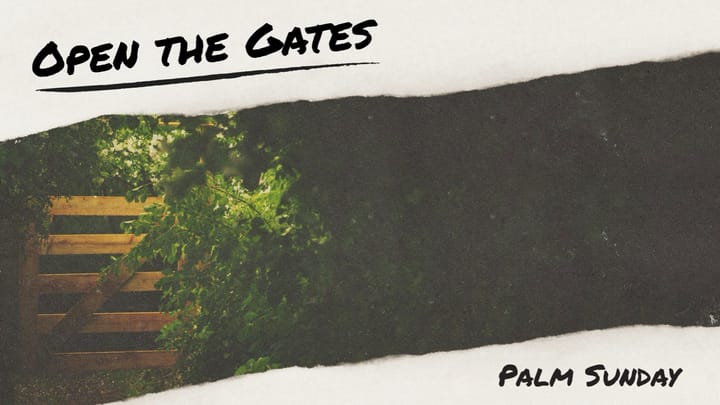Fairhaven Sermon 11-10-2024

In this week's service at Fairhaven United Methodist Church, Rev. Dylan Parson's focus was on giving and generosity inspired by Mark 12:38-44, where Jesus commends a poor widow's contribution while criticizing the extravagant gifts of the wealthy. Parson began by acknowledging his discomfort discussing money but emphasized its importance in spiritual growth and the life of the church.
Rev. Parson challenged the congregation to approach giving as a spiritual discipline, committing to regular, proportionate contributions based on faith and trust in God's provision. He reminded them that their offerings extend beyond Fairhaven, impacting global ministries like relief efforts, education, healthcare, and advocacy for the marginalized. Using a giving calculator provided, Parson encouraged church members to evaluate their current contribution percentage and consider increasing it. He concluded by quoting John Wesley, emphasizing the transformative power of money when used to serve others and meet needs in God's name.
Transcript
So, I'll come right out and say it at the beginning here, because we're in the middle of a series where we're talking about giving. And first of all, I don't like talking about giving at all. I don't like preaching about this. So please understand my discomfort this whole month.
Notice that we have not done a pledge campaign in my five years, and who knows how long before that. No one can really remember the last time we've done anything like this. I don't like talking to you about money. I don't like doing it in the direct way that I'm doing.
Ben's finance report, usually I feel like that's good enough. And so this passage in Mark 12 is extra uncomfortable for me to preach on, particularly as someone who's literally walking around in a long robe, someone who gives long prayers. Jesus talked about those people pretty derogatorily in that passage. This story is regularly abused too, honestly.
It's not at all unheard of for churches, for Christian leaders to use the example of the poor widow giving literally all that she has as a tool to persuade people who have next to nothing to hand it over to them, right? We all know about the stories of pastors with private jets who get on TV and beg old people on social security to sew a seat of faith and cut them a big check. We know about churches who build stadium-sized buildings for themselves while not a penny trickles out to those outside their walls, all while lifting up the example of this humble widow giving her pennies. So I want to be clear that that is not what this story is meant to do. Jesus is not condoning that.
He's not making a way for any of that. And in fact, the opposite is true. Notice that our reading begins with this fiery condemnation of the legal experts of the rich who cheat widows out of their homes while making sure they have the very best seat in the synagogue, that they're honored by the community for their faithfulness and philanthropy. These are the Andrew Carnegie's, the Henry Clay Fricks of the first century.
They build these grand shady side churches. They donate generous sums to libraries and museums with their names on them. And they do that while exploiting their workers, polluting the environment, flooding the city of Johnstown, right? That's what these people are like. Jesus has nothing but hatred for that.
And he is delivering this fierce critique in this passage of the rich and of the powerful. This is a condemnation of the system where this kind of stuff happens. The rich get richer and are honored for it while the poor suffer more and more at their hands. And Jesus puts this on the religious sphere in the hands of the synagogue and the temple, which is of course nowadays the church.
And so I really don't think, I do not believe that Jesus would advise that poor widow to do what she does. Jesus does not want people to starve for the sake of the kingdom. The rich should be sacrificing more and the poor widow much less. If there's one consistent tone in Jesus' economic teaching is that the rich need to consider whether they should be rich at all for the sake of their souls.
And on the other hand, God's going to uplift the poor. All of that said, if we are not in the situation of desperation that that widow is, we shouldn't feel like this story gets us off the hook. Consider, and this is always true in reading the Bible, what person in the narrative are we, right? Consider whether your position is more like that widow's whose entire net worth fits in one hand or the rich person's who is fundamentally capable of offering more to God. And then hear this story accordingly.
Jesus is calling us and his disciples in the story to a deep honesty here, and that's with ourselves and with God. I can't tell you which of those positions you're personally in. I can't tell you if you're a poor widow or one of the other people in the long robes like me, but the Holy Spirit can. And I know where I and the majority of American Christians stand.
So faithfully following Jesus is of course not a matter of how much we give to the church to support the body of Christ. That's not the case. Notice the supposedly generous rich here in Mark 12. Jesus says they give a lot of money to the temple treasury, but they get no credit from Jesus because they're not actually generous at all in any kind of proportional way.
The same way it's not an act of generosity for a billionaire to hand a homeless person a hundred bucks. It's just not. The same way that it's not generous for an investor to give a university $50 million in exchange for getting their name on the side of a building. That's not generous.
Generous insofar as it can be measured is the degree to which we turn everything over to God, giving what we can. For most of us, this is in reality through our financial resources a lot of the time. But we have more than that to offer. It's also our service to the church, to the community, our consistent prayers for the church, for one another, our willingness to witness to our faith to other people, and our commitment to simply take the time to show up, to worship, to mission, to ministry.
And these are the things that we promise to offer God through the church in our baptismal and membership vows, by the way. You might remember those, you might not. But we promise to give our prayers, our presence, our gifts, our service, and our witness to God through the church. And so even if you don't have two copper coins to rub together, you've got the rest of these things.
You've got your prayers, you've got your time, you've got your witness, you've got your service. But we have to understand, we can't dodge this, I always want to dodge it, we have to understand that there's something specifically, uniquely important about trusting God and the church with our money when our lives and culture center around money so completely. Jesus says in Matthew 6 that where your treasure is, so too is your heart. Giving it to God's work, whenever we trust ourselves to manage it better, and anyway, who knows, we might need it, right? Is a profoundly counter-cultural act of faith.
You can give to more efficient charitable causes than the church. You can. But we have to understand this, that giving is not about just the needs of the church, it's something that we do to conform ourselves to the lifestyle that we're called to in Christ. We give because God gives to us, and all of it belongs to God to begin with.
That's why we switched up the doxology this month. So as I was planning this sermon, reading the scripture, I came upon a somewhat obnoxious hymn about giving last week. And I decided not to make us all sing it today, because like I said, it's pretty obnoxious. We already did enough of that today.
But as I first rolled my eyes at this hymn, I found myself convicted that it's correct, it's just cringey. So much of our life, and by that I mean our viability, our strength as a church, as Fairhaven, and our spiritual health as individuals, so much of our spiritual life is truly in our hands, even as we like to pretend that it isn't. So this is a couple stanzas here. The hymn writer is Carolyn Winfrey Gillette, and she writes, Giving God, we pause and wonder, what would happen if we tithed, if we gave our gifts, Creator, hearts and hands all open wide.
We might learn by gladly sharing not to trust in things we own, but to risk, it's part of caring, and to trust in you alone. We could do abundant mission sharing Christ, who claims and frees. We could reach out with new vision in creative ministries, no more bound by limitations of what churches can't afford. We could learn with jubilation whole new ways to serve you, Lord.
Like I said, obnoxious, but true. You might feel that what you have to offer couldn't really possibly make a difference to the church, to God's kingdom, to the world, and you're wrong. The same way that the bread and the wine of communion are somehow transformed by God's power into Christ's body and Christ's blood, your gifts, even if it's two copper coins, are transformed into this vast wealth benefiting the kingdom of God because of what God adds to it. God sees our faithfulness and responds by blessing our work that we do together.
Remember that 2 Corinthians reading last week, our theme for the month. I'm going to keep going back to this. God has the power to provide you with more than enough of every kind of grace. That way, you'll have everything you need, always and everything, to provide more than enough for every kind of good work.
No congregation in history has ever given itself to death, has done too much mission outreach, evangelism in the community that they had to shut the doors. And I think you'd be hard-pressed the same way to find someone who's ended up on the streets because they've been too generous with their time and their giving. Faithfulness begets faithfulness. Our strength and our viability, our future as a congregation is much more than we'd like to believe, I promise you.
A choice that is in your hands. God's power will always be with us, always accessible to us, but to a very large degree, the work is ours to take or leave. Churches do not, there's few exceptions, but churches do not live or die through no fault of their own. We make that choice every day.
We do. What we offer up is of priceless importance and not just for the maintenance of our own facilities, our well-being, but for the kingdom worldwide. This is not just about the electric bill and my salary, not that those expenses don't matter, in my opinion, but our giving can and does help alleviate the suffering of those poor widows of our world today, those people who have truly nothing. So we, unlike the rich people in Mark 12, we can orient ourselves differently.
We can orient ourselves towards the needs of the poor and the marginalized among us and in the global community. The offerings that we receive in this church, and we forget about this a lot, they join those of our United Methodist siblings worldwide. We rebuild in the wake of catastrophic hurricanes. Milton, Helene, the United Methodist Church was there first, helping people clean out their houses, helping with food, water, rebuilding.
We do that. We educate students from poor backgrounds so that they can reach for a better life. We built an entire university in Zimbabwe about 20 years back that has educated thousands of leaders in that continent. We provide dignity and care for refugees in Ukraine, in Africa, at the southern border.
We do all of that with our offerings. We send missionaries around the world from Indian reservations in South Dakota to the tiniest little islands in the Philippines or up in the mountains of Guatemala. We send those people. And it's genuinely incredible what the UMC is able to do around the world because of millions of individuals and tens of thousands of churches giving together and working together.
And we all know, I think a little more intimately, the powerful impact we see up close. The Christmas store regularly provides for over a hundred kids. Think about that. They're going to remember that for the rest of their lives.
Their parents will remember that we helped do that. We are pantries. We have one at Spencer and one here. Our food pantries are emptied every day.
And the regular help that we're able to offer those who need assistance in keeping their gas or electric from being shut off or preventing an eviction, you all don't know about that because I don't report every time that I do it, but we do that all the time. So consider all of that. Look at everything that you make possible by making an active contribution to God's work in the world. What we give, what we offer of ourselves matters.
It has an impact no matter how big or small. The point is doing what we're able to do out of faith. I'm reminded of something that John Wesley famously said, and he said, Give me 100 preachers, he wrote, who fear nothing but sin and desire nothing but God. And I care not a straw whether they be clergymen or laymen.
Such alone will shake the gates of hell and set up the kingdom of God on earth. Now, that's about preachers, and most of you aren't preachers, but the principle holds. Give what you can. Don't hold back.
Desire to love God and our neighbors and see what God can do through you and us together. So this morning, you've received two things. There's an envelope, too, so three things, right? A giving commitment slip and a giving calculator. So I would challenge you to start praying now, and we'll collect these back in two weeks.
I'll be back in two weeks, and we can collect these. So if you don't already, think about how you might approach regular, consistent, committed giving as a spiritual discipline. An act of faith where you say to God, Yes, I'll do this every week or month, even not knowing exactly what lies ahead of me in the weeks, the months, the years ahead. Make the choice in advance.
Pick a number in advance in faith that God will make sure you have enough, and then follow through, you know, without evaluating each time you give how much it feels like you can give. Don't give what's left over in your wallet once everything is said and done for the month. Remember what Jesus says here in Mark 12, 44. He critiques the giving of the rich to the temple.
Those people are giving a lot, by the way, but he says they are giving their spare change. The opposite of that is the biblical concept of first fruits. Before you look at any other need you have, give to God and then trust that it will all come together. So I challenge you to use that calculator table that you receive, the cardstock piece, and just think about, evaluate how much you're giving to God's work through Christ's church.
What percentage is it? Have you ever thought about it in those terms? Have you ever determined whether you're giving 1, 3, 5, 10 percent? Or do you give your spare change? Evaluate whether that present amount is what you're able to do and whether that's what God's calling you to do. It could be. It could be. But again, that's a matter of honesty.
This is a call to honesty with yourself and God. The Holy Spirit will tell you, so pray over it. And so as squirmy as the topic of money makes us and makes me, this is something we can't escape. If Jesus Christ is our Lord, he's Lord of our finances as well.
And yes, that's a call to sacrifice, to discipline, like so much of the Christian life is. But we also can't forget that our giving provides us a tangible means to get involved with what God is doing among us, around us, and through us. And so once again, I just want to quote Wesley. Wesley, by the way, died with next to nothing to his name.
I think he had 10 pounds. Not because he was destitute, not because he was bad with money, nothing like that, but because he wouldn't even get his hair cut so he could save all of his money to give away to poor people. Wesley walked the walk here, but he says this, Money is an excellent gift of God, answering the noblest ends. In the hands of his children, it is food for the hungry, drink for the thirsty, raiment for the naked.
It gives the traveler and the stranger where to lay his head. By it we may supply the place of a husband to the widow, and of a father for the fatherless. We may be a defense for the oppressed, a means of health to the sick, of ease to them that are in pain. It may be as eyes to the blind, as feet to the lame, yea, a lifter up from the gates of death.
Could it be any clearer what we are able to do? Watch God transform your two copper coins offered in faith into a life-changing fortune, both for the one who receives it and the one who gives it. In the name of the Father, and the Son, and the Holy Spirit. Amen. Amen.
But with each century they do, they learn a little bit more.


